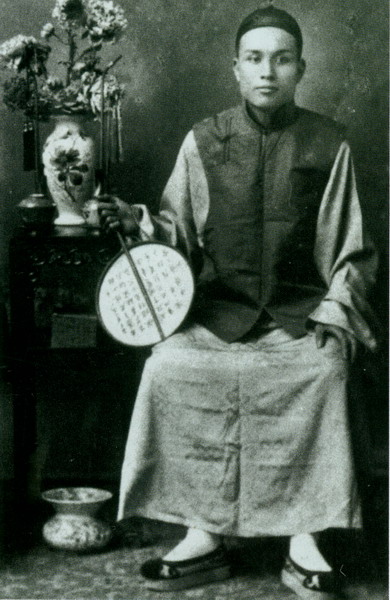首页 > Cuiheng Village > Historical celebrities
Lu Can

Photo of young Lu Can
Lu Can, also known as Lu Wencan, Liben or Bingqian, nicknamed Yisheng, was born in Cuiheng Village in 1874. In the autumn of 1883, Sun Yat-sen and Lu Haodong damaged the god statues at the Beiji Hall, Lu Can and another kid were on watch against the keeper.
In 1887, 13-year-old Lu Can studied at Punahou School in Honolulu, and was the first Chinese graduate of this school. In 1895, Lu Can returned to Cuiheng for marriage. Whenever Lu Haodong returned to Cuiheng from provincial capital Guangzhou, he would visit Lu Can’s house. At the end of this year, knowing the failure of the Guangzhou Uprising and the arrest of Uncle Lu Haodong, Lu Can and Village Head Lu Xingfudiverted the Qing soldiers tracking down Sun Yat-sen in Cuiheng Village by bribery as instructed by his granduncle (a country gentleman in nearby Tangjia Village). Lu escorted Sun’s relatives to Honolulu, which was praised extensively by overseas Chinese. Zheng Zhao later recalled, “Lu Can is just and reliable, and we also compare his deed to a loyal ancient generalZhao Zilong rode alone torescuedLiu Shan.” Lu joined the Revive China Society through persuasion by Sun Yat-sen, served as head of the Honolulu branch for many years, and often provided funds to Sun Yat-sen. Lu also served as translator of The Hawaiian Chinese News in Honolulu, and often communicated with Chen Shaobai, chief editor of China Daily in Hong Kong on Chinese news. Lu founded the Chinese-Western Forum with He Kuan, Zheng Jin, etc. with The Hawaiian Chinese News being the base, and Sun Yat-sen spoke at the forum many times. The forum members were the Chinese in Honolulu who supported Sun Yat-sen’s revolution first, and many of them funded the revolution.
In January 1912, Sun Yat-sen took the office of Provisional President of Republican China in Nanjing. On January 26, Lu Can returned to China with Sun Ke and some overseas members of the Chinese Revolutionary League, who lived at the President Mansion in Nanjing. After Sun Yat-sen’s resignation, Lu Can returned to Guangzhou with Sun. In the following year, Lu Can went to Honolulu again. He had never seen Sun Yat-sen ever since, but his worship ofSun had never changed. He wrote memoirs in his later years, such as Sun Yat-sen—As I Knew Him, Summary of Sun Yat-sen’s Official Affairs, and Summary of Sun Yat-sen’s Experiences in Honolulu, hailing Sun Yat-sen as a “brave and selflessidealist”, and the “greatestforerunner of China’s liberation”.
Lu Can was enthusiastic about overseas Chinese affairs. When he served as head of the Chinese Affairs Division of the Diplomacy Department of the Honolulu government and director of the U.S. Citizenship and Immigration Services, he assisted Chinese in Honolulu in boarding, participated in founding the Global Chinese Student Association, See Dai Doo Society, and Hawaii Chinese Guild, and served as chairman of the Chinese-Western Forum, See Dai Doo Society, and Hawaii Chinese Guildor secretary of Manoa Lin Yee Chung Association for a long time. He contributed much to Chinese public programs in Hawaii.
